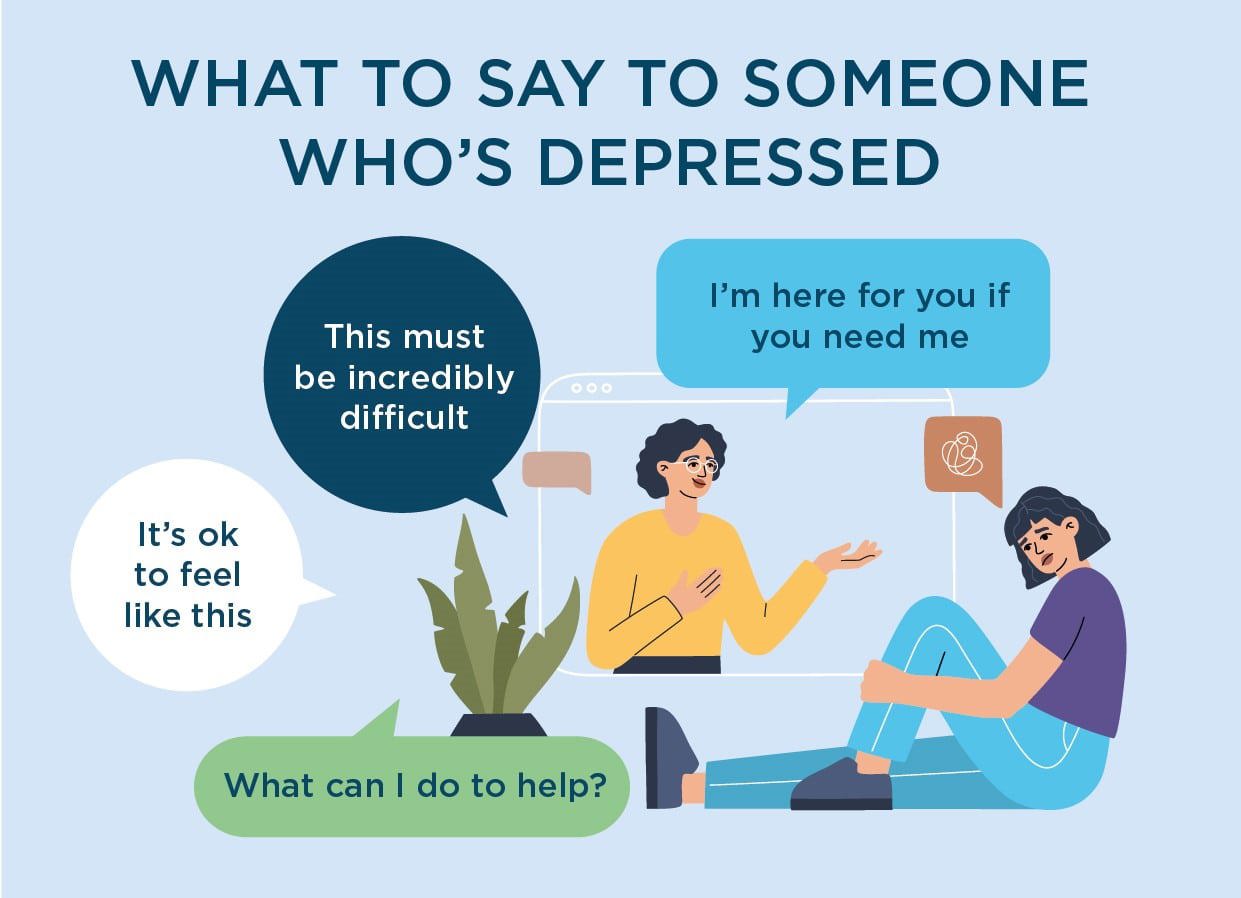How to help someone with depression
Recognising the signs of depression in a loved one is the first step towards offering the support and care they need.
Recognising the signs of depression in a loved one is the first step towards offering the support and care they need.



With depression, you may experience a sense of helplessness and feel as though you don’t know where to turn, or what to do for the best. However, the support of friends and family can play a hugely important role in helping someone recovering from depression.
Here we break down a few ways you can help and support someone with depression.
There are a wide range of symptoms of depression, but the most commonly recognised include:
Depression isn’t anyone’s fault
It’s important to understand that your loved one can’t help the way they’re feeling and it’s not their fault. Treating your loved one with compassion and understanding is incredibly important.
You can’t flick a switch and cure depression
Unfortunately, there’s no quick fix for depression and your loved one can’t simply ‘pull themselves together’. It will take small steps for them to recover, and what helps one person will not necessarily help someone else.
Patience is invaluable
When you’re suffering from depression, the thought of getting out of bed and going through the daily motions can be exhausting. However, this doesn’t mean your loved one lacks the motivation to get better. Allow them to go at their own pace and comfort level, and support them where you can.
Depression is a serious but treatable condition
Your role here isn’t to ‘fix’ your loved one’s depression. In most cases, it takes professional treatment from highly qualified people to overcome depression. The best thing you can do is be as supportive, compassionate and patient as possible. If your loved one is open to it, you can suggest things that can help to motivate them when depressed and it could be something you both enjoy doing.
If you've recognised the signs and symptoms of depression in someone close to you, it can be incredibly helpful to have an open and honest conversation about it, so that you can begin to develop an understanding of what they’re going through and reassure them that they’re not alone.

The best time to raise this subject with your loved one is in a situation and location where you know they feel relaxed and at ease, and somewhere where you won’t be interrupted. Car journeys are a good example, or perhaps when you’re in a quiet local café.
It’s important that you start the conversation off in a non-confrontational and open-ended way. Try to focus the questioning on your perspective instead of putting it all on them. You could say things like: “I’ve been a bit worried about you lately” or “I’ve noticed that you haven’t been yourself and wanted to talk to you about it”.
The focus on ‘I’ instead of ‘you’ takes the spotlight away from them and makes it more likely that they’ll feel comfortable enough to open up to you.
After you've initiated the conversation, it’s a good idea to have some questions ready to ask them. This will help you to gain more information about their mood and emotions and be in a better position to help. Your questions might include:
If your loved one does want to open up to you, it’s important that you respond to them in a compassionate and supportive way. You could use phrases such as:
Things that it would be unhelpful for you to say to a depressed person include:
People with depression can often feel isolated and find it hard to talk about their depression. Be willing to talk openly with your loved one about their feelings and listen to what they have to say. This will show them that no matter what they might be going through and how negative everything may feel to them, they are loved and valued.
It’s also important to be an active listener and really immerse yourself in the conversation. Use verbal and non-verbal prompts during the conversation, maintain eye contact throughout, and regularly paraphrase what your loved one says back to them, to clarify meaning and demonstrate that you've understood them. This will make opening up to you as easy and natural as possible for your loved one, making it more likely that they’ll confide in you in the future if they need to.
If you've never experienced depression, it can be difficult to understand what your loved one is going through, which is why it’s so important to avoid being critical or impatient. They’re probably being very self-critical already, so responding to their needs in a non-judgemental way shows that you recognise what they’re going through is difficult. It's also important that you avoid instructing them how to feel or talking about how you would feel about the situation. Instead, try to encourage them to come up with their own solutions.
Remember, depression is different for everyone. It’s really important that you don’t try to make comparisons or assumptions. The only thing this is likely to do is make them feel invalidated and misunderstood, which could then lead to a further decline in their mood as well as discouraging them from opening up.
Depression can have a negative impact not just on the emotional elements of a person’s life, but also on the more practical side. They may struggle to keep on top of daily chores and responsibilities due to a lack of energy or general interest in day-to-day life.
It can be really helpful to offer practical support to your loved one, whenever they need it. They may wish for you to help them, or they may wish for you to join them in activities such as shopping, cleaning or cooking.
Also, little gestures to let your loved one know that you’re thinking of them can go a long way. Buy them their favourite magazine, surprise them with flowers, pick up the phone to tell them you love them, or just sit with them in silence – it can all really help.
All types of depression are treatable, whether your loved one is struggling with clinical depression, seasonal affective disorder (SAD) or any other type of depression. This is a key message to try and reinforce to your loved one. Connecting with a mental health professional means that your loved one’s condition can be evaluated and some proactive next steps put in place – but only if they feel ready.
If they’re nervous about speaking to a professional, offer to go with them to any initial appointments and help them to make a list of their symptoms to talk through.
Your loved has taken an incredibly brave step by asking for help for their depression. From here, the best thing you can do is be as supportive as possible throughout the treatment process.
If, at any point, you think your loved one is at risk of suicide, take immediate action. Call a national helpline, like Samaritans, book an urgent appointment with their GP, or head straight to your nearest A&E department.
